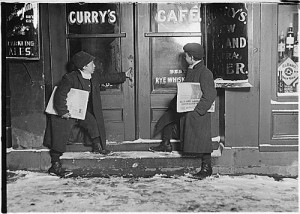Rev. Justin Nash
Although the chapters and verses that were inserted into our Bibles are usually helpful, they can also create unnatural divisions in the author’s train of thought. In this case, Galatians 5:13 and 6:10 serve as bookends for this closing application in Paul’s letter.
“For you were called to freedom, brothers. Only do not use your freedom as an opportunity for the flesh, but through love serve one another” (5:13).
“So then, as we have opportunity, let us do good to everyone, and especially to those who are of the household of faith” (6:10).
In the Galatian church, the Judaizers were promoting a false teaching that Christianity required not just faith in Christ but obedience to the Jewish law as well. As we’ve noted previously, false teaching always creates division. Paul’s prescription to prevent and to heal this division is serving one another in love.
Love does not come naturally to us. The flesh will always choose love of self rather than loving others. Paul gives us five admonitions in how to serve:
1) Don’t Do This
“Let us not become conceited, provoking one another, envying one another” (5:26).
This verse provides the counterpoint to the following verses. Conceit, provoking, and envying are not compatible with loving and serving.
2) Restore
“Brothers [and sisters], if anyone is caught in any transgression, you who are spiritual should restore him in a spirit of gentleness. Keep watch on yourself, lest you too be tempted” (6:1).
Being caught here does not mean discovered, but ensnared in sin. “Your adversary the devil prowls around like a roaring lion, seeking someone to devour” (1 Pet. 5:8b). All of us are vulnerable to being pounced upon and caught by the lion and stuck in sin. We in the church are to be working to restore those who are so ensnared. The word restore has the sense of realigning or setting a broken bone. This is not just the job of the pastor or elders. Paul says it is the role of “you who are spiritual.” Looking back to the previous chapter, this is everyone who is living by the Holy Spirit and in whom the fruit of the Spirit is evident.
This is a major function of church discipline—restoring sinners. It’s not about punishment or shame, and it should not be harsh or critical. Rather it should be done in a spirit of humility and gentleness. We approach others lovingly, remembering that we too are sinners saved by grace. We do so carefully, not presumptuously thinking “That could never happen to me.” If even King David, the man after God’s own heart, could fall into sin, so can we. As Paul wrote to the Corinthian church, “Therefore, let anyone who thinks that he stands take heed lest he fall” (1 Cor. 10:12).
Gentle restoration is contrasted with the conceited from verse 26. Those who are conceited are thinking the best of themselves and the worst of others. They are prideful and condemning. When a brother falls into sin, their first reaction is judgment, not sorrow. Those who are conceited make the church an unsafe place for sinners. They are more likely to shoot the wounded than to restore them.
One primary way to restore others is to remind one another constantly of the gospel—grace, forgiveness, and freedom are found in Jesus Christ.
Who do you notice who may becoming ensnared by sin? How might you help to restore them? Are you in need of restoration?
3) Bear
“Bear one another’s burdens, and so fulfill the law of Christ” (6:2).
We all have burdens to carry, but none of us were meant to bear our burdens alone. God intends for us in the Body of Christ to come alongside one another to share our burdens. We are to “rejoice with those who rejoice, and weep with those who weep” (Rom. 12:15). God’s people are His gift to one another—the hands, hearts, and backs to bear the load.

The Judaizers were adding to the burden of the believers in Galatia by insisting that they had to obey the Jewish law. But Christianity is fulfilled in the law of love, “For the whole law is fulfilled in one word: You shall love your neighbor as yourself” (5:14). That may sound easy, but when Jesus gave that command He said, “just as I have loved you, you also are to love one another” (John 13:34b). His love is perfect and was demonstrated by sacrifice—His own death on the cross. Such love is impossible in our human strength. It is only God’s love flowing in and through us that enables us to love others and bear one another’s burdens. In construction, load bearing walls are those that are necessary to support the structure. In the church, we are all load bearing walls. Without loving one another sacrificially, the whole structure is likely to collapse.
Bearing one another’s burdens is the opposite of provoking one another in verse 26. There are people even in the church who are constantly tearing others down, competing, self-promoting, and mocking. They compare themselves with everyone else, not with God’s perfect standard. They are unwilling to stoop down in humility to shoulder another’s burden.
Burden bearing is costly and it will be inconvenient, but it is essential for Christian unity. We are to point one another to the Savior who said, “Come to Me, all who labor and are heavy laden, and I will give you rest” (Matt. 11:28).
Who among our fellowship may be getting bogged down in discouragement and anxiety? Who is overwhelmed with the trials of life? How can you help others? Are you in need of help yourself? Who can you talk to?
4) Share
“Let the one who is taught the word share all good things with the one who teaches” (6:6).
Those who teach the truth of the Word are worthy of financial support. It takes a lot of time, study, and energy to prepare lessons week after week. The ministry of teaching is perhaps the most important thing a pastor/elder can do.
“And proclaim as you go, saying, ‘The kingdom of heaven is at hand.’ …the laborer deserves his food” (Matt. 10:7-10).
“Let the elders who rule well be considered worthy of double honor, especially those who labor in preaching and teaching” (1 Tim. 5:17)
“In the same way, the Lord commanded that those who proclaim the gospel should get their living by the gospel” (1 Cor. 9:14).
Those who are envious (5:26) do not give freely of their resources. They hold tight to what they have—money, power, and control. There are pastors who suffer need because of tight-fisted church members.
We shouldn’t just honor our pastor during October’s Pastor Appreciation month, but all year round. We are to share good things with him, not just our leftovers and discards. We are to give generously and continually, so that the pastor can do all that God has called and gifted him to do in preaching the word at all times. “You will be enriched in every way to be generous in every way, which through us will produce thanksgiving to God” (2 Cor. 9:11).
Are we caring well for our pastor?
5) Sow
“Whatever one sows, that will he also reap… And let us not grow weary of doing good, for in due season we will reap, if we do not give up” (7, 9).
Much of Galatians has been about living in the flesh versus living by the Spirit. Non-Christians have no choice, they can only live in the flesh. But as Christians we are given the Holy Spirit and we can choose whether we’re going to listen to the Spirit or the flesh. Actions always have consequences. We can’t indulge the desires of the flesh and hope to receive life. (See Galatians 5:19-22 for examples of living by the flesh.)
Only the Holy Spirit gives life. We can’t do this in our own strength. It is God’s work in us. Only He can grow the fruit of the Spirit in us. We can help to cultivate the soil by spending time in His Word, in prayer, and in fellowship with the Body of Christ. These disciplines keep reminding us of the truth and drawing our attention back to God’s will rather than our fleshly desires. Growing in the grace of God takes time and perseverance. There is no instant gratification like there may be in indulging our temptations. We have to be patient because God is working on an eternal timeline.
Where are your affections of the heart and mind? Are you sowing to the flesh or the Spirit?
Conclusion
Our life is a limited time opportunity to serve others in the name of Christ. We are to love and serve those outside the church, but it is especially important to serve those who are our brothers and sisters in Christ, because this points others to Christ. “By this all people will know that you are My disciples, if you have love for one another” (John 13:35).
Let us live out the gospel each day, serving one another in love.






